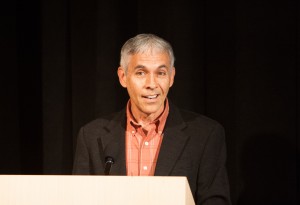
In a small Missouri farm town, a young 12-year-old boy began a town scandal when he asked for more time before signing a document alleging his Methodist faith. Thus began the journey of faith for Dr. Brent Slife that included a college clinging to atheism, a re-conversion to Christianity found in a philosophy class and the current position of psychology professor at BYU.
In a lecture on Thursday, Oct. 17, Slife outlined several turning points that led him to become a scholar of faith. As a self-proclaimed hillbilly, Slife recalls when he first questioned the faith of his Methodist mother. His concerns over the United Methodist document outlining the 25 article of their faith were left unresolved.
“The leaders of my church didn’t know what the church stood for,” Slife recalled.
This investigation led Slife to acclaim atheism as he headed into college, but it was there that he found a rekindling of his faith in the most unlikely of places.
“People are surprised when I tell them that the study of philosophy helped in my conversion to Christianity,” Slife said. “But I remember thinking that everything that made sense to me had already been espoused by Jesus Christ.”
After a double major in psychology and philosophy, Slife received his masters and doctoral degrees in Clinical Psychology from Purdue. After 13 years of teaching and researching, Slife accepted a position at BYU and made an immediate impact as a scholar of faith, influencing students right away, including now-colleague Jeffrey Reber.
“I was assigned to be Slife’s graudate TA in 1995 in my second semester as a graduate student,” Reber said. “I didn’t want to work with him; I didn’t know who he was, and I wanted to work with Dr. Ridge.”
After a while, Slife’s influence made a tremendous impact on Reber’s plans and aspirations.
“It changed my path completely,” Reber said. “Even though I’m a social psychologist I’m a very different social psychologist because of Dr. Slife’s influence.”
Slife has become known for helping students to think critically about their own assumptions and how those assumptions impact the way they perceive and add value to the world around them.
“He has insights that aren’t very common is psychology, so it gives us a different perspective on issues that we come across,” said Taylor Smith, a senior in the psychology program who is currently taking a class from Slife.
Aaron Johnson has also found himself changed by studying with Slife.
“It’s turned my mindset about psychology around,” said Johnson, who is a senior from Mesa, AZ. “I now try and pinpoint the assumptions so that I don’t fall into the same traps.”
But it isn’t just psychology where students are being influenced by Slife’s unique perspective on critical thinking. Mikelle Norton, a psychology major from Cottonwood Heights, has been spiritually influenced while attending Slife’s lectures.
“I have felt the Spirit stronger in his critical issues class than the majority of my religion classes,” Norton said. “God designed us to be critical thinkers; he encourages that. In Slife’s class sometimes I take revelatory notes rather than stuff that’s just from the class.”
“This is a great place; I feel blessed to be here,” Slife said. “I have a strong strong sense of mission here. I am able to interface the faith and the secular. It’s encouraged here.”
Slife’s influence is making an argument for the inclusion of God and matters of faith in the field of psychology. It is this challenging of assumptions that has earned him many prestigious awards like the Karl G. Maesar Award, Eliza R. Snow Fellowship and APA best-seller status.
His research has changed the way many think about psychology as a discipline by challenging its assumptions. Reber believes his impact has been crucially important.
“The biggest thing he has done is uncover assumptions that psychologists have made in their research and therapy that have led us down paths that have not illuminated our understanding of human beings that we hoped they would,” said Reber.
BYU students and faculty alike have been influenced by the watchdog, questioning mentality of Slife, a mentality that is willing to ask the discipline of psychology, “What if God mattered?”




